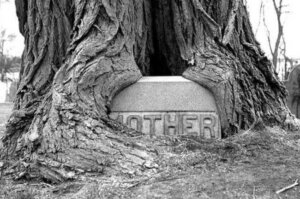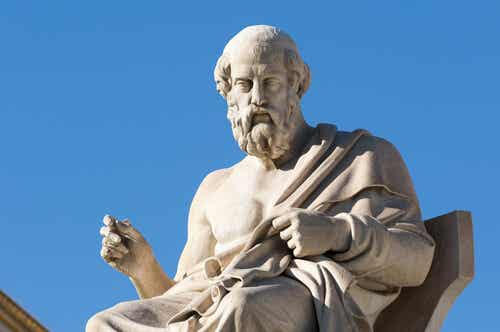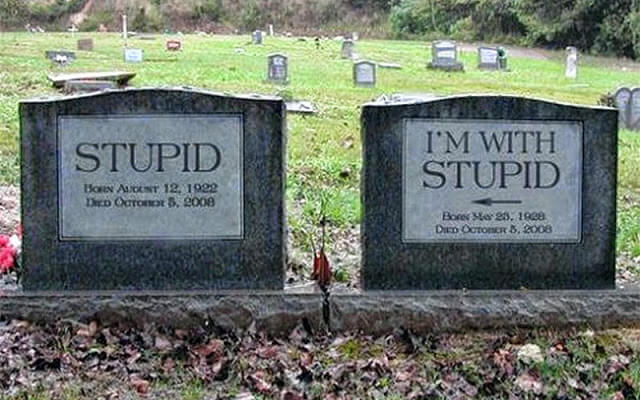Epitaphs of the Rich and Famous

Epitaphs are, above all, a literary tribute that the living pay to the dead. They’re texts that are usually inscribed on a person’s grave or headstone. Formerly, it was extremely common for people to invent epitaphs, especially if the person who’d died was a personality or someone famous.
However, today, funeral rites have been simplified. Furthermore, death has become a topic few want to know about and it isn’t willingly spoken about.
Indeed, almost everyone wants to avoid this particular issue at all costs. That’s why epitaphs have fallen into disuse and now only temporary and impersonal tombs tend to be seen in cemeteries.
“Often the grave encloses, unknowingly, two hearts in the same coffin.”
-Alphonse de Lamartine-
This is a real shame because, in addition to being a beautiful literary genre, the epitaph also represents a guide, a light to remember that departed person by. Sometimes, epitaphs also show great ingenuity and creativity. Proof of this can be found in those of certain celebrities, like the ones we share with you below.
Epitaphs of poets and writers

On many occasions, men of letters created their own epitaphs. Alternatively, their admirers or followers wrote them. They can often be moving or even devastating sentences.
As a matter of fact, epitaphs are almost always literary pieces by themselves and beautifully recall the essence of the work of the departed. Here are some of them:
- “Here lies the poet Vicente Huidobro. Open this grave, at the bottom, you can see the sea“. Vicente Huidobro.
- “As ye pass by the tomb where my ashes consume, Oh! moisten their dust with a tear”. Lord Byron.
- “… and I will go away. And the birds will stay singing…” Juan Ramón Jiménez.
- “I only ask God to have mercy on the soul of this atheist“. Miguel de Unamuno.
- “If I didn’t live any longer, it was because I didn’t have time”. Marquis de Sade.
- “This wallpaper and I are fighting a duel to the death. Either it goes, or I go”. Oscar Wilde.
- “More light, more light. Open the window so that more light may come in”. Goethe.
- “Here lies Molière the king of actors. Right now he is playing dead and he really does it well”. Molière.
- “Bring down the curtain, the farce is played out”. Rabelais.
- “Cast a cold eye, on life on death. Horseman, pass by!” W.B. Yeats.
Epitaphs of famous men

Either out of vanity or to make a statement, many of the great men of history designed their own epitaphs in order to be remembered. At other times it was their trusted men, followers, or even their enemies or victims who took on the task. Here are some examples:
- “As for the earth, it covers the body of Plato; on the other hand, as for his soul,· it is in the rank of one who does not die”. Plato
- “A tomb now suffices him for whom the world was not enough“. The tomb of Alexander the Great.
- “To Castilla and León: Columbus gave a new world”. Tomb of Christopher Columbus.
- “I am prepared to meet my Maker. Whether my Maker is prepared for the great ordeal of meeting me is another matter”. Sir Winston Churchill.
- “Do not envy the peace of the dead”. Nostradamus.
- “Called or uncalled, God will be present”. Carl Gustav Jung.
- “Have I played the part well? Then applaud me as I exit”. Augustus.
- “I do not expect anything, I fear nothing, I am free”. Nikos Kazantzakis.
- “He snatched lightning from the sky and the scepter from tyrants”. Benjamin Franklin.
Anonymous and witty epitaphs

There are hundreds of graves and headstones in the world that contain amazing epitaphs. Some of them give accounts of certain aspects of the lives of those who lie there, or of their relatives. Others seem to almost represent a kind of revenge.
Most show great ingenuity and the ability to face death creatively. Here are some examples:
- “With love from all your children, except Ricardo who did not give anything”. In a grave in the cemetery of Salamanca.
- “Here lies my wife, cold as always”.
- “Here lies one who was devotedly faithful to art and honor. He was no great thing in life and now he is absolutely nothing”. (A friend wrote this on Castelli’s tombstone)
- “As much peace you carry as rest you leave“.
- “We brought nothing, we took nothing, we lost nothing”.
- “It took me a lifetime to get here”.
- “That’s All Folks!”
The epitaph acts as an eternal goodbye. Furthermore, death, finally, gives a definitive meaning to each life, that’s included in the epitaph.
It would be an interesting exercise to think about what our own epitaph will be. I, for example, would say “I always wanted to go one step further…” What would your epitaph be?
This text is provided for informational purposes only and does not replace consultation with a professional. If in doubt, consult your specialist.








